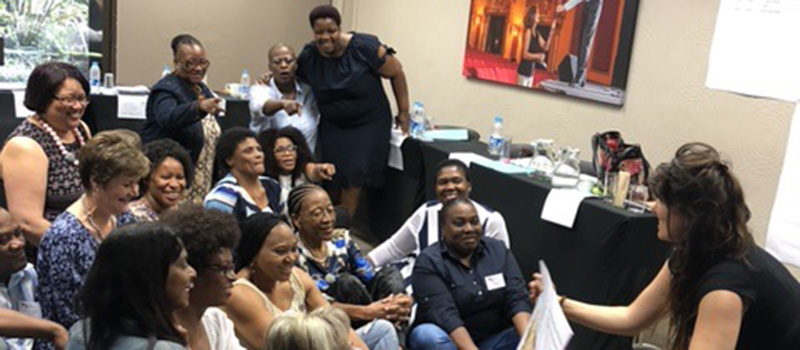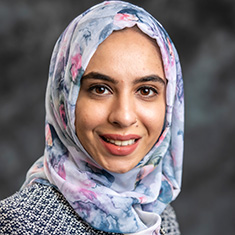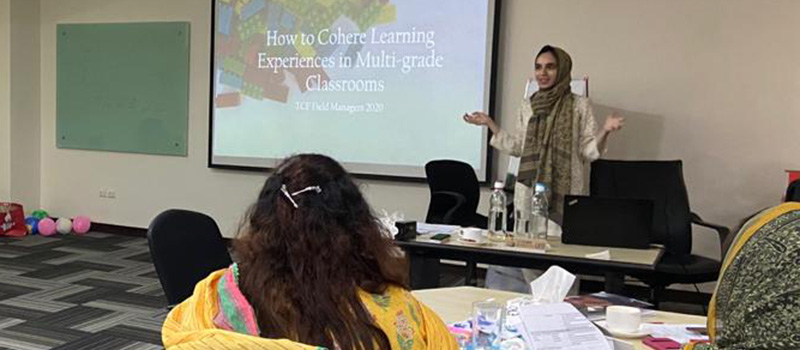2020 Wall Service Award recipients redesigning teaching methods in South Africa, Pakistan
Dec. 14, 2020 — Kaitlin Alsofrom ’10 and Mariam Asaad ’14 are the recipients of Grinnell College’s 2020 Joseph F. Wall ’41 Alumni Service Awards. Each will use the $35,000 award to further projects that raise the effectiveness of teaching and learning in South African and Pakistani schools.
During Grinnell College’s sesquicentennial celebration in 1996, the Joseph F. Wall ’41 Service Award was established as a tribute to the College’s 150-year tradition of social commitment. The award was named in honor of Joseph Wall ’41, professor of history and longtime dean of the College, who inspired an ideal of social responsibility in his students.
Each year, a committee composed of alumni, a student, and several faculty members, review applications and award the $35,000 prizes to either jump-start or complete a project that shows creativity and commitment to effecting positive social change.
Since 1996, the Wall Service Award has been presented to 56 individuals who have contributed their time and talents to 50 diverse projects throughout the U.S. and in eight other countries. The College has given out more than $1 million to the Wall winners over the past 24 years.
The following is a closer look at the projects of this year’s recipients.
Kaitlin Alsofrom ’10
 Kaitlin Alsofrom ’10
Kaitlin Alsofrom ’10
It is widely acknowledged in South African education circles that the country is experiencing a youth reading crisis. A significant percentage of South African students cannot read with comprehension. And since literacy is the foundation for all other academic success, the problem has many repercussions.
Kaitlin Alsofrom has a solution, and with the help of the Wall Award prize, she’s prepared to address the South African literacy crisis from the ground up. Her project will research, design, and pilot a set of daily lesson plans and required teaching resources that provides Grade R (the South African equivalent of Kindergarten) teachers with a comprehensive teaching program.
“Up until this point, Grade R interventions across South Africa have not been successful for a variety of reasons,” Alsofrom says. “Intervention materials are overly complicated for teachers to put together and therefore go unused, and there is no mechanism for support or accountability. I have found in my own research that teachers buy into structured learning materials because they are designed to make teachers’ lives easier, and because they are designed to foster professional development for teachers in their own classrooms.”
 Kaitlin Alsofrom ’10, right, presents materials to her colleagues in Class Act Educational Services.
Kaitlin Alsofrom ’10, right, presents materials to her colleagues in Class Act Educational Services.
As a literacy and curriculum design specialist for Class Act Educational Services, Alsofrom has specialized in designing low-resource curricular materials for primary and secondary school teachers. The final tangible outcomes of her project will be a high-quality, open-source teaching program consisting of structured policy-aligned lesson plans, teaching resources needed to enact the plans, and a comprehensive training program.
“My interest in this work comes from a deep personal investment in understanding how teachers create change at the classroom level together with a passion for ensuring access to high quality education for all children,” she says.
Mariam Asaad ’14
 Mariam Asaad ’14
Mariam Asaad ’14
In Pakistani public schools, multi-grade teaching – where one teacher educates multiple grades simultaneously – is a common phenomenon. It’s also a common obstruction to productive learning. Similar to Alsofrom, Mariam Asaad has helped developed a project aimed at increasing student outcomes and teacher productivity.
The project, which began in 2019, innovates across systems-design, curriculum, and pedagogy and focuses on six priority themes: training, resources, space, rhythm, strategies, and support.
“The project is designed to be simple, easy-to-adopt, and impactful,” Asaad says. “It addresses the system’s current constraints and aims to optimize student outcomes within that instead of functioning on utopian assumptions. It is important to me because it provides an opportunity to actually pilot some of the changes that I wish to see in the system and has the added likelihood of being scaled to millions of children in the country – a prospect I am humbled, scared, and excited by.”
Asaad is a program design advisor for The Citizens Foundation, Pakistan’s largest nonprofit education provider. She is involved with piloting this system redesign in 198 multi-grade teaching schools that the foundation operates under a public-private partnership with the provincial government of Punjab. The project is directly impacting at least 200 principals, 424 teachers, and 33,000 students.
 Mariam Asaad ’14 gives a talk to area managers about design changes envisioned as part of the multi-grade teaching intervention.
Mariam Asaad ’14 gives a talk to area managers about design changes envisioned as part of the multi-grade teaching intervention.
The Wall Award funding will primarily be used for content development and training. Project materials will also be made available in the public domain.
After graduating from Grinnell, Asaad served as a Teach for Pakistan (TFP) fellow for two years where she taught in a government school.
“Thinking back to the overworked and under-motivated government teachers, and teacher-less classrooms I encountered during my time at TFP, I am optimistic about the potential of this project,” she says. “Seeing the impact of COVID-19 related closures in populations with little to no internet access and knowing that this fallout is expected to continue makes me all the more energized about the new design elements that we are exploring this year.”
—by Jeremy Shapiro
For your information:
Grinnell College will begin taking applications for the 2021 Wall Service Award in January. Check out the Wall Service Award web page for additional information and a list of recent winners.
To read more alumni news, check out our news archive.